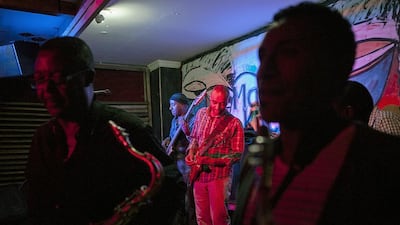Heaps of twisted iron, piles of ash and a charred microphone are all that remains of Jazzamba, the iconic Addis Ababa nightclub that revived Ethiopian jazz after it had all but disappeared under Communist rule.
The fire that destroyed the venue in January has left the country’s vibrant and growing jazz scene in disarray.
“I still do not believe it,” says musician Misale Legesse, who was a regular performer at the wood-panelled club, inside the Taitu Hotel.
The century-old hotel, one of the most historic buildings in the city, gained fame as the setting for Scoop, Evelyn Waugh's 1938 satirical novel about foreign correspondents.
But the hotel’s Jazzamba bar brought prestige of another sort as it fostered a resurgence of the Horn of Africa’s unique jazz style – a genre created in the 1960s by music legend Mulatu Astatké, who fused jazz with traditional Ethiopian music.
“For me, it was not just a club, it was my school, where I learnt everything and played with the greatest,” Legesse says.
Three nights a week, the young musician would play with the big names of Ethio-jazz, such as Alemayehu Eshete or Bahta Gebrehiwot.
Jazzamba only opened four years ago but swiftly became the capital’s landmark jazz club, run and managed by the musicians themselves.
“Musicians from all walks of life came to play with each other – we had up to 300 or 400 people huddled in the room, and that really helped create a movement,” said Henok Temesgen, a bassist and one of the founders of the club.
Jazzamba also played a key role in the international rediscovery of the Ethio-jazz genre, forgotten by many during the hardline communist regime of Mengistu Haile Mariam, whose 17-year reign of terror ended when he was ousted in 1991.
During his rule – including the “Red Terror” purges in which tens of thousands were executed – musicians suffered years of suppression under military rule and Ethiopia’s music scene all but died.
The clubs closed and many musicians fled into exile. “Apart from songs in praise of the regime and some nightclubs, there was nothing going on,” said Temesgen.
It was not until the late 1990s that the Ethiopian jazz scene started to recover. “People no longer had the habit of listening to instrumental music,” Temesgen says. “It was necessary to have a live singer. Today, thanks to radio stations and clubs such as Jazzamba, the public is much more open to improvisation and experimental music.”
Jazzamba was the first club in Addis Ababa to offer concerts every night and to promote jazz as more than background music. Since it opened, interest in Ethio-jazz – with its distinctly non-Western scale – has grown.
“The Ethiopian music scene is very dynamic,” says Girum Mezmur, co-founder of Jazzamba. “The local public is interested more in Ethio-jazz and traditional music, and more and more people came to the concerts.”
Then the accident happened – a blaze ruled to have been accidental due to “electrical overload” and confined mainly to the jazz club.
While the fire came as a shock, Ethiopia’s jazz musicians are resilient, having weathered even worse adversity in the past, and show no sign of slowing down now. Since the fire, musicians have taken refuge at Mama’s Kitchen, a new restaurant that stages several concerts each week and aims to become a hub for the Addis music scene.
The Coffee House, one of Addis Ababa’s earliest jazz clubs, has also recently reopened after being closed for years.
Convinced that Ethio-jazz has a bright future, Mezmur and Legesse founded a music school near the capital three years ago, so far teaching about 70 students.
Income from Jazzamba paid for the school. With the venue gone, Ethiopian wine producer Awash has stepped in to fund the school for a year.
“We lost an iconic club in a place full of history, it’s true, but the music scene in Addis is not limited to Jazzamba,” Mezmur says. “I am very optimistic about the development of Ethiopian music.”

